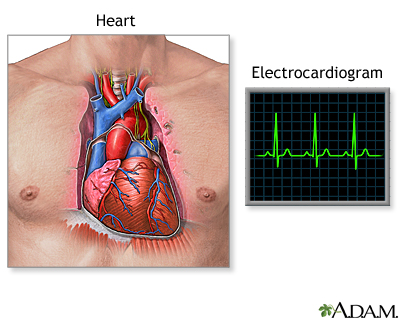Cocaine intoxication
Intoxication - cocaine
Cocaine is an illegal stimulant drug that affects your central nervous system. Cocaine comes from the coca plant. When used, cocaine causes the brain to release higher than normal amounts of some chemicals. These produce a sense of euphoria, or a "high."
Cocaine intoxication is a condition in which you're not only high from using the drug, but you also have body-wide symptoms that can make you ill and impaired.
Images

I Would Like to Learn About:
Causes
Cocaine intoxication may be caused by:
- Taking too much cocaine, or taking a too-concentrated a form of cocaine
- Using cocaine when the weather is hot, which leads to more harm and side effects due to dehydration
- Using cocaine with certain other drugs
Symptoms
Symptoms of cocaine intoxication include:
- Feeing high, excited, talking and rambling, sometimes about bad things happening
- Anxiety, agitation, restlessness, confusion
- Muscle tremors, such as in the face and fingers
- Enlarged pupils that don't get smaller when a light shines into the eyes
- Increased heart rate and blood pressure
- Lightheadedness
- Paleness
- Nausea and vomiting
- Fever, sweating
With higher doses or an overdose, more severe symptoms can occur, including:
- Seizures
- Loss of awareness of surroundings
- Loss of urine control
- High body temperature, severe sweating
- High blood pressure, very fast heart rate or irregular heart rhythm
- Bluish color of the skin
- Fast or difficulty breathing
- Death
Cocaine is often cut (mixed) with other substances. When taken, additional symptoms can occur.
Exams and Tests
If cocaine intoxication is suspected, the health care provider may order the following tests:
- Cardiac enzymes (to look for evidence of heart damage or heart attack)
- Chest x-ray
- CT scan of the head, if head injury or bleeding is suspected
- ECG (electrocardiogram, to measure electrical activity in the heart)
- Toxicology (poison and drug) screening
- Urinalysis
Treatment
The provider will measure and monitor the person's vital signs, including temperature, pulse, breathing rate, and blood pressure.
Symptoms will be treated as appropriate. The person may receive:
- Breathing support, including oxygen, a tube down the throat, and ventilator (breathing machine)
- IV fluids (fluids through a vein)
- Medicines to treat symptoms such as pain, anxiety, agitation, nausea, seizures, and high blood pressure
- Other medicines or treatments for heart, brain, muscle, and kidney complications
Long-term treatment requires drug counseling in combination with medical therapy.
Outlook (Prognosis)
The outlook depends on the amount of cocaine used and what organs are affected. Permanent damage may occur, which may cause:
- Seizures, stroke, and paralysis
- Chronic anxiety and psychosis (severe mental disorders)
- Decreased mental functioning
- Heart irregularities and decreased heart function
- Kidney failure requiring dialysis (kidney machine)
- Destruction of muscles, which can lead to amputation
Related Information
Toxicology screenCentral nervous system
Cardiovascular
Stroke
Arrhythmias
Substance use
Substance use disorder
Drug use first aid
References
Aronson JK. Cocaine. In: Aronson JK, ed. Meyler's Side Effects of Drugs. 16th ed. Waltham, MA: Elsevier; 2016:492-542.
Chary MA, Erickson TB. Cocaine and other sympathomimetics. In: Walls RM, ed. Rosen's Emergency Medicine: Concepts and Clinical Practice. 10th ed. Philadelphia, PA: Elsevier; 2023:chap 144.
BACK TO TOPReview Date: 1/2/2023
Reviewed By: Jesse Borke, MD, CPE, FAAEM, FACEP, Attending Physician at Kaiser Permanente, Orange County, CA. Also reviewed by David C. Dugdale, MD, Medical Director, Brenda Conaway, Editorial Director, and the A.D.A.M. Editorial team.

Health Content Provider
06/01/2025
|
A.D.A.M., Inc. is accredited by URAC, for Health Content Provider (www.urac.org). URAC's accreditation program is an independent audit to verify that A.D.A.M. follows rigorous standards of quality and accountability. A.D.A.M. is among the first to achieve this important distinction for online health information and services. Learn more about A.D.A.M.'s editorial policy, editorial process and privacy policy. A.D.A.M. is also a founding member of Hi-Ethics. This site complied with the HONcode standard for trustworthy health information from 1995 to 2022, after which HON (Health On the Net, a not-for-profit organization that promoted transparent and reliable health information online) was discontinued. |
The information provided herein should not be used during any medical emergency or for the diagnosis or treatment of any medical condition. A licensed medical professional should be consulted for diagnosis and treatment of any and all medical conditions. Links to other sites are provided for information only -- they do not constitute endorsements of those other sites. © 1997- 2025 A.D.A.M., a business unit of Ebix, Inc. Any duplication or distribution of the information contained herein is strictly prohibited.
